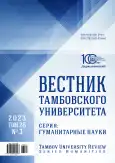Damascius as a source on the intellectual history of Early Byzantine Athens
- Authors: Denisova I.V.1
-
Affiliations:
- Belgorod State National Research University
- Issue: Vol 28, No 3 (2023)
- Pages: 716-724
- Section: FOREIGN COUNTRIES’ HISTORY
- URL: https://journal-vniispk.ru/1810-0201/article/view/297979
- DOI: https://doi.org/10.20310/1810-0201-2023-28-3-716-724
- ID: 297979
Cite item
Full Text
Abstract
Importance. The study of the biography and legacy of the philosopher Damascius, one of the early Byzantine Neoplatonic philosophers, is relevant in the context of studying the intellectual life of Early Byzantine Athens in the 5th – early 6th century. A special role among the sources on the history of philosophy of the 5 – beginning of the 6th century belongs to the work of the Neoplatonic philosopher Damascius “Philosophical History, or the Life of Isidore”. At the same time, in addition to the “Philosophical History”, Damascius is the author of a number of other works and neoplatonic commentaries, which are mentioned in the sources.Research methods. In considering the problems of historical knowledge in the context of intellectual history on the basis of the studied sources and historiography, taking into account the whole range of methodological approaches, the following methods used in the study should be distin-guished: comparative-historical, historical-genetic, systemic.Results and Discussion. The biography of the author of this work is investigated, as a result of which it is shown that he was directly related to early Byzantine Athens, where he studied and then worked as a teacher. The information of Damascius about Athens in the above era was also analyzed and verified. The study found that Damascius is an important and reliable source on this issue, as he received information either first-hand – from friends, students or teachers at the Athens School of Philosophy, or was a direct eyewitness or participant in the events.Conclusion. It is concluded that, although the emphasis in the Philosophical History is on the philosophical school in Athens, the work of Damascius is a direct continuation of the treatise “The Life of Philosophers and Sophists” by the writer of the 4th century Eunapius, developing the genre of intellectual history with a biographical emphasis.
About the authors
I. V. Denisova
Belgorod State National Research University
Author for correspondence.
Email: eivv@mail.ru
ORCID iD: 0000-0002-6612-4191
PhD (History), Associate Professor of General History Department, Director of the Museum of History
85 Pobedy St., Belgorod, 308015, Russian FederationReferences
- Martindale J.R. (ed.). (1980). The Prosopography of the Later Roman Empire: in 3 vols. Cambridge, Cambridge University Press, vol. 2, A.D. 395–527, 1342 p. Available at: https://archive.org/details/plre-ii (accessed 16.12.2022).
- Bolgov N.N., Bolgova A.M. (2019). Aleksandriiskie shkoly 5 v. po «Filosofskoi istorii» Damaskiya [Alexandrian schools of the 5th century on the “Philosophical History” of Damascius]. Iresiona. Antichnyi mir i ego nasledie [Irecion. The Ancient World and its Legacy]. Issue 6, pp. 105-136. https://elibrary.ru/gqyfuh
- Athanassiadi P. (1993). Persecution and response in late paganism: the evidence of Damascius. The Journal of Hellenic Studies, no. 113, pp. 1-29. https://doi.org/10.2307/632395
- Afonasin E.V. (2020). Damascius in Athens: selected fragments of his philosophical history. Platonovskie issle-dovaniya = Platonic Investigations, vol. 13, no. 2, pp. 285-317. https://doi.org/10.25985/PI.13.2.14, https://elibrary.ru/brwbjh
- Watts E. (2006). City and School at Athens and Alexandria. Berkeley, Los Angeles, London, University of Cali-fornia Press, 288 p. Available at: https://books.google.ru/books/about/City_and_School_in_La-te_Antique_Athens_a.html?id=0j94OFipg2MC&redir_esc=y (accessed 16.12.2022).
- Martindale J.R. (ed.). (1992). The Prosopography of the Later Roman Empire: in 3 vols. Cambridge, Cambridge University Press, vol. 3, A.D. 527–641, 1575 p. Available at: https://archive.org/details/prosopo-graphy-later-roman-empire/PLRE-III-A/ (accessed 16.12.2022).
- Cameron Al. (2019). The Last Days of the Academy in Athens. The Cambridge Classical Journal, no. 15, pp. 7-29. https://doi.org/10.1017/S1750270500030207
- Watts E. (2005). Where to Live the Philosophical Life in the Sixth Century? Damascius, Simplicius, and the Return from Persia. Greek, Roman, and Byzantine Studies, vol. 45, no. 3, pp. 285-315. Available at: https://grbs.library.duke.edu/index.php/grbs/article/view/321 (accessed 16.12.2022).
- Denisova I.V., Sinitsa M.M. (2022). Agapius, the early Byzantine neoplatonic, and his school in Constantinople. Problemy istorii, filologii, kul’tury = Journal of Historical, Philological and Cultural Studies, no. 2 (76), pp. 175-186. https://doi.org/10.18503/1992-0431-2022-2-76-175-186, https://elibrary.ru/ixofar
Supplementary files








